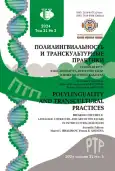The History of Arabic-Tatar Language Contacts in the Sociolinguistic Aspect
- 作者: Mirkhayev R.F.1
-
隶属关系:
- Tatarstan Academy of Sciences
- 期: 卷 21, 编号 3 (2024): BREAKING THE CIRCLE: LANGUAGE, LITERATURE, AND ART OF THE TATARS IN INTERCULTURAL DIALOGUES
- 页面: 459-468
- 栏目: Languages in contact
- URL: https://journal-vniispk.ru/2618-897X/article/view/326912
- DOI: https://doi.org/10.22363/2618-897X-2024-21-3-459-468
- EDN: https://elibrary.ru/KOMGGC
- ID: 326912
如何引用文章
全文:
详细
In the process of its development, the Tatar language has been in contact with the Arabic language for many centuries and, to one degree or another, has been influenced by it. The result of all this was a fairly large number of borrowings, which, to a certain extent, have long been rooted in the vocabulary of the Tatar language and are not perceived even by the common man in the street as alien. At present, we can say with confidence that in lexical and semantic terms they have been studied thoroughly. At the same time, Arabic-Tatar language contacts, which largely contributed to the formation of the indicated genetic layer of the Tatar language, are still awaiting their scientific understanding in the sociolinguistic aspect. This determines the relevance of this work. Its goal is to study the cultural and historical factors that contributed to the penetration of the Arabic language into the Tatar linguistic area, the social environment of its existence and areas of application in Tatar society in a diachronic aspect. The material used was works on the history of the Tatar people, Tatar literature and the Tatar literary language. In the process of their analysis, methods of sociolinguistic reconstruction and sociolinguistic interpretation were applied. As a result of the study, it was revealed that the formation and development of Arabic-Tatar language contacts was largely facilitated by factors of a religious nature, namely the adoption and practice of Islam by the ancestors of the Tatars. Next, the boundaries of the social environment and spheres of application of the Arabic language in Tatar society were determined. Historically, the first was formed within the community of clergy, scientists and students of religious educational institutions, and the second were religion, education, science and fiction. According to the author, it was within their framework that centuries-old ArabTatar language contacts took place.
作者简介
Rifat Mirkhayev
Tatarstan Academy of Sciences
编辑信件的主要联系方式.
Email: mirhaev77@mail.ru
ORCID iD: 0009-0004-9740-8957
Doctor of Philology, Associate Professor, Leading Researcher of the Department of General Linguistics, the Institute of Language, Literature and Art named after G. Ibragimov
20 Bauman St, Kazan, 420111, Russian Federation参考
- Zahvataeva, K.S. 2010. “Language contacts: basic concepts and their stratification.” Izvestia: Herzen university journal of humanities & sciences, no 126, pp. 165–170. Print. (In Russ.)
- Gilemshin, F.F. 2023. “XIX — the Beginning of the XX Century as a Special Stage in the History of the Tatar literary language.” Polylinguality and Transcultural Practices, vol. 20, no. 2, pp. 216–226. Print. (In Russ.) https://doi.org/10.22363/2618-897X-2023-20-2-216-226
- Kadirova, Je.H. 2001. Poems ʻTuhfai Mardanʼ and ʻNur-i Sodurʼ by Mukhamedyar: vocabulary. Kazan: Dom pechati publ. Print. (In Russ.).
- Minnullin, B.K. 2012. “Arab-Persian and Turkish borrowings in Tatar periodicals language of the beginning of the XXth century”. Philology. Theory & Practice, vol. 6, no. 17, pp. 99–101. Print. (In Russ.).
- Mohammadiev, M.G. 1991. Prose language of Sh. Kamal. Kazan: SSSR FA KFҮ G. Ibraһimov isemendege Tel, adabijat һam tarih instituty publ. Print. (In Tatar).
- Nurieva, F.Sh. 2004. Historical and linguistic conditions for the formation of the Turkic-Tatar literary language of the Golden Horde period. Kazan: Kazanskij gosudarstvennyj universitet publ. Print. (In Russ.).
- Baskakov, N.A. 1969. Introduction to the study of Turkic languages, 2nd ed., corrected and expanded. Moscow: Nauka publ. Print. (In Russ.)
- Usmanov, M., and R. Hakimov, R. 2006. History of the Tatars from ancient times. In seven volumes. Vol. II. Volga Bulgaria and the Great Steppe. Kazan: RuhIL publ. Print. (In Russ.)
- Bolshakov, O., and A.L. Mongait. 1971. The Journey of Abu Hamid al-Garnati to Eastern and Central Europe. (1131–1153): Translation from Arabic. Moscow: Nauka publ. Print. (In Russ.)
- Usmanov, M., and R. Hakimov. 2009. History of the Tatars from ancient times. In seven volumes. Vol. III. Ulus of Jochi (Golden Horde). XIII — the middle of the XV century. Kazan: Institut istorii AN RT publ. Print. (In Russ.)
- Hakimov, R. 2014. History of the Tatars from ancient times. In seven volumes. Vol. IV. Tatar states XV–XVIII centuries. Kazan: Institut istorii AN RT publ. Print. (In Russ.)
- Hakimov, R. 2013. History of the Tatars from ancient times. In seven volumes. Vol. VI. Formation of the Tatar nation. XIX — early XX centuries. Kazan: Institut istorii AN RT publ. Print. (In Russ.)
- History of the Tatar literary language (XIII century — early XX century). 2015. Composed and edited by Bashirova, I.B., Nurieva, F.Sh., Kadyirova, E.Kh., and F.M. Khisamova. Vol. I: Phonetics. Graphics: written traditions, standart and variability. Kazan: TƏһSI publ. Print. (In Tatar)
- The beauty of gardens and the comfort of suffering souls. 2022. Composed by Gumerov, I.G., Rahimov, S.T., and A.M. Ahunov. Bolgar: Bolgarskaja islamskaja akademija publ. Print. (In Russ.)
- Hakov, V.H. 2003. Language is a mirror of history (from the history of the development of the Tatar literary language. Kazan: Tatar. kit. nəshr. publ. Print. (In Tatar)
- History of Tatar literature: in eight volumes. 2015. Composed and edited by Rahmani, R.F., and H.J. Minnegulov. Vol. 3: XIX century. Kazan: Tatar. kit. nəshr. publ. Print. (In Tatar)
补充文件









